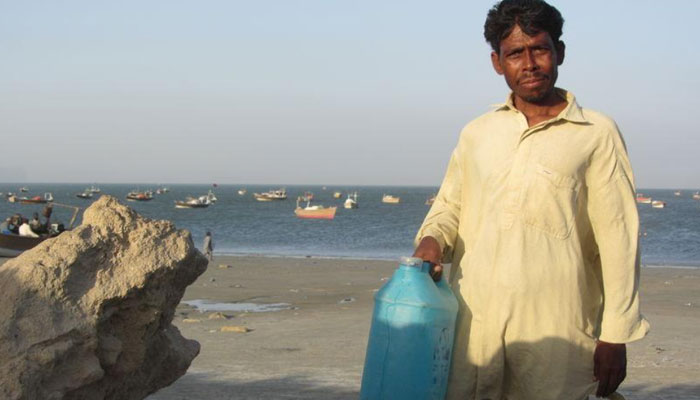Climate policy: Saving the rights of Pakistan's coastal communities
It is imperative to go beyond the rights of coastal states and discuss the rights of those living in the coastal areas of Pakistan
December 05, 2022

The US Environmental Protection Agency (EPA) has launched the Office of Environmental Justice and External Civil Rights. The newly created office will work towards ensuring environmental justice and civil rights in overburdened communities, recognizing the link between environmental and human rights, especially the rights of marginalized and indigenous communities.
People’s right to a clean, healthy, and sustainable environment was first recognized through the UN General Assembly (UNGA) resolution 76/300. The Escazu agreement is the first environmental treaty for Latin American and Caribbean nations.
Pakistan has already recognized the civil and political aspects of the environment by making it a provincial subject under the 18th Amendment, but has not practically done anything in this regard.
The destruction of the world’s fifth-largest mangrove forests and swamps on the Indus Delta coast threatens fishery resources and the livelihood of fishermen. In 2020, many areas in Sindh witnessed protests against the presidential ordinance that allowed the federal government to take over the Bhundar (Bundal) and Dingi coastal islands.
In 2021, fishermen protested the federal government’s plans to grant fishing rights and issue licences to outside trawlers in Gwadar. This decision lacked legitimacy as it was not backed by the will of the coastal communities. What is at issue is whether the coastal communities have any say regarding their environmental and human rights under the 18th Amendment.
The rights of coastal states are addressed by the UN Seabed Committee and 2749(XXV) the UNGA resolution, and are dealt with under the UN Convention on the Law of the Sea, adopted in 1982. Its preamble states that the states parties have agreed that the achievement of all goals “will contribute to the realization of a just and equitable international economic order which takes into account the interests and needs of mankind, and the special interests and needs of developing countries, whether coastal or land-locked”.
Article 2 of Section 1 of Part II says that the sovereignty of a coastal state extends beyond its land territory and internal waters and, in the case of an archipelagic state, its archipelagic waters, to an adjacent belt of sea, described as the territorial sea. Article 55 of Part V, defines the exclusive economic zone (EEZ) as an area beyond and adjacent to the territorial sea.
Article 56 states that in the EEZ, the coastal state has “sovereign rights for the purpose of exploring and exploiting, conserving and managing the natural resources of the waters superjacent to the seabed and of the seabed and its subsoil, and with regard to other activities for the economic exploitation and exploration of the zone”.
Instruments like the 1987 Treaty on Fisheries and the 1979 Fisheries Agency Convention promote cooperation among states on fisheries policies.
The state, therefore, can exercise sovereignty over its territorial waters, and explore and exploit the EEZ, but not at the cost of its vulnerable population. French political philosopher Jean Bodin’s statement on sovereignty is often misinterpreted because he emphasizes that sovereigns are bound by the laws of the state.
The International Court of Justice, in the 1951 fisheries case, while determining the limit of territorial sovereignty at sea, decided that traditional rights over fishing grounds are founded on the vital needs of the population under customary international law.
Being a coastal state, Pakistan enjoys many rights under this convention. It has several domestic laws, including the Fisheries Act 1897, and other provincial enactments. In 2019, Karachi was included in the jurisdiction of the Sindh Coastal Development Authority, which is responsible for the development of the coastal areas of Thatta, Badin and Sujawal.
However, the environmental, civil, political and human rights of Pakistan’s coastal provinces must be extended collaterally with the state’s sovereignty under the 18th Amendment. All decisions by the federal or provincial government are likely to lack legitimacy unless they are backed by the vulnerable communities, surviving and thriving on the natural resources at the coastal provinces.
Such decisions should not violate their right to life and employment, and these communities should be protected against displacement, which is not covered under domestic laws or international refugee law unless they cross international borders. It is also crucial to empower the environmental protection agencies of Pakistan and its coastal provinces in this regard.
It is imperative to go beyond the rights of coastal states and discuss the rights of those living in the coastal areas of Pakistan.
The great Faiz Ahmad Faiz detailed such concerns in his movie ‘Jago Hua Savera’ (1959), based on the Bengali novel ‘Padma Nadir Majhi’ by Manik Bandopadhyay that highlights the plight of East Pakistan’s poor fishermen.
The writer is a lawyer and a faculty member at the Department of International Relations, University of Karachi.
Originally published in The News











